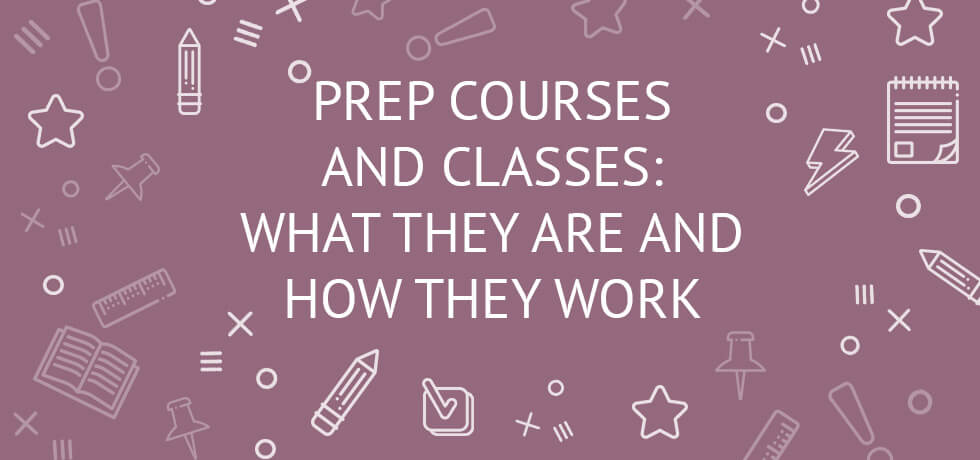Prep Courses and Classes: What They Are and How They Work

When people talk about high school or college prep courses and classes, they often misunderstand each other, because they may talk about entirely different things that are all known by this same term. Sometimes, people refer to prep classes offered by the colleges themselves. Other times, a prep course may mean a private or state-run program to aid the less fortunate social groups to enter colleges. Also, people tend to call this way a specific group of high schools that are heavily focused on preparing their students for entering particular colleges.
So, we have put together this article to clarify the differences between various understandings of college and high school prep courses, as well as to explain in detail what they are and how they work. We are going to illustrate the activities and functions of high school preps classes, programs to facilitate the admission to college, and the private and public high schools which aim at ultimately preparing their students for being admitted to college.
#1 Standard high school curriculum as a preparation for college
We need to remember that preparing students for entering college is the primary goal of high school, the very reason for its existence. The education system suggests that what you learn in high school should get you ready to enter college. This is why the basic high school classes are often referred to as college prep classes.
This is why the standard high school education is arguably the most valid definition of “college prep classes.” These classes may vary in different schools, but normally they include math, science, and social studies – three years each, plus four years of English.
These are the disciplines that comprise the state exam in the states and districts where it is practiced. For example, if you want to graduate from high school in Massachusetts, you will have to pass three MCAS (Massachusetts Comprehensive Assessment System) exams – in math, English, and in one of the science- or technology-related disciplines.
The essential idea is that college prep classes (in this understanding) are using the standard curriculum, not the Honors or AP and, of course, not the remedial ones. They are the core of the high school education program. Therefore – technically, you cannot say that you are taking a college prep class if you are in an Honor / AP class.
College Preps vs. Honors / AP
As soon as you find yourself enrolling into high school, it is up to you to decide whether to take standard college prep classes or to go with the Honors / AP. On the one hand, Honors / AP programs give you more knowledge, but on the other hand, they are more challenging, and it is harder to get good grades there than with the standard curriculum.
To make the right decision, you should evaluate your abilities and be aware of them. If you feel like you can easily get straight A's in a standard prep class, then it makes sense to go to an Honor / AP class instead. You will feel more challenged indeed, and you might even get your straight A's somewhat diluted with B's. But, you will end up more qualified, and – more importantly, a B earned at an Honor or AP class is usually more regarded by the admission officers than an A from a standard prep class. Moreover, a set of straight A's from a standard class will picture you like someone who likes to avoid any challenge and would rather prefer a non-competitive environment, and nobody likes that, including college admission officers. It is a much better idea to demonstrate yourself as a self-challenging type, hungry for more knowledge and eager to master their skills.
However, if you do not feel so confident and you feel like you are more likely to get C’s or even D’s at an Honors or AP class, then you obviously better take an standard college prep class and have higher grades. Understanding your potential without overestimating it is a very mature thing which is also taken into account by the admission officers at colleges.
So, it is best to take Honors / AP classes only in subjects that you feel particularly comfortable with and take a more relaxed pace with the rest. Of course, if you want to make the right decision, you need to be well-informed. So, you try and take a look at the actual curriculum of both standard college prep classes and Honors / AP classes before you decide which classes to take.
College Prep Courses as Programs to Aid College Admission for Certain Social Groups
As we have mentioned, by "college prep courses" people often mean certain programs – both private and state-run – that aid the admission to college for applicants who would otherwise be not very likely to get enrolled. For this purpose, the programs focus on various aspects of the admission process: from conducting additional training to increase the applicants' academic skills to straightforward financial aid to pay the applicants' tuition partially or in its entirety.
These college prep programs can be community-, university-, state-, and federal-based. Here are some examples:
Federal-based programs (TRIO)- Contrary to what one may think, TRIO is not an acronym. It used to stand for the number of such programs which was three. Today, there are eight. The aforementioned social groups of students for whom these programs are intended are physically and financially challenged people, as well as first-generation Americans. TRIO programs include:
- Upward Bound. This program is aimed at helping financially challenged students who have no access to higher quality secondary education due to their financial state. It works by placing the applicants into a simulated college environment that includes counseling, tutoring, and other instruction. Through the years of its existence, Upward Bound has proved to be effective in providing both academic and motivational support to these applicants.
- Talent Search. This program offers a wide range of counseling services to help students from financially challenged backgrounds or first-generation Americans to earn proper high school grades as they graduate so they could get admitted to college same as their more fortunate fellows.
- SSS (Students Support Services). This program employs a full range of instruments to assist all of the aforementioned groups of applicants, including those with special needs. The assistance that the SSS offers includes all forms of instruction – from individual mentoring and tutoring to academic advising and career counseling, as well as financial aid guidance and even additional funding.
- GEAR UP (Gaining Early Awareness and Readiness for Undergraduate Programs). This program is mostly aimed at raising awareness among the financially challenged and other minority applicants about what higher education is actually about. This includes informing these groups of students about academic and career planning, as well as individual mentoring and tutoring. GEAR UP also has its own scholarships.
- State-based programs
- The States of New York, California, and New Jersey offer the so-called Educational Opportunity Programs to applicants who happened to fail to complete the standard high school prep class for economic, health-related or personal reasons but demonstrate a pronounced potential for a successful academic and professional future.
- The State of New York has also worked out Pre-Collegiate Preparation Programs to enforce effective communication and cooperation between all organizations, people, and other bodies that may be involved in the enrollment process. It is aimed at providing every applicant with all the available opportunities to be admitted and get a college education.
- The State of California offers the so-called Cal-SOAP (California Student Opportunity and Access Program) to financially challenged students and first-generation Americans to ensure their opportunities for college education. The program runs through all the applicant’s pre-college years, from kindergarten and up to the end of high school.
- The State of Florida has CROP – College Reach-Out Program. It works with sixth- through twelfth-grade school students providing them with all sorts of assistance and mentorship to get successfully admitted to college and graduate. CROP is targeted at students from financially and otherwise challenged backgrounds.
- University-based programs
- The University of California has an EOAP – Early Academic Outreach Program. These are basically special courses for high school students who want to enrich their knowledge in particular disciplines and to prepare them specifically for the entrance exams. It is also good for obtaining general information about the university life.
- The University of Colorado also has a Pre-Collegiate Program. While providing all kinds of instruction, this program is primarily aimed at motivating and raising awareness about higher education among all the underrepresented social groups of students, including first-generation Americans.
- Community-based and NGO Programs
- AVID (Advancement Via Individual Determination). This program is focused on academic assistance for fifth- through twelfth-grade school students who show potential for success in higher education and career but are financially or otherwise challenged.
- "I Have a Dream" is a program that works in areas notorious for challenging financial state to help children from these areas to pursue higher education of their choosing. It offers long-term mentoring and tutoring.
College Prep Classes as Schools Specifically Designed for Preparing to Apply for College
Last but not least, there are these high schools specifically aimed at preparing their students for further education. They also get referred to as high school prep classes. This is the only thing by which these schools are grouped together. Otherwise, they can be public or private, they can be boarding or charter schools, they can even be parochial.
Schools like these include:- Gateway High School. It is located in San Francisco, and it is a charter school. The students get to visit college from the first day of 9th grade.
- Cardinal Ritter College Prep High School. This school is to be found in St. Louis. The students have the opportunity to graduate with up to 18 hours of college credit before they even start college.





